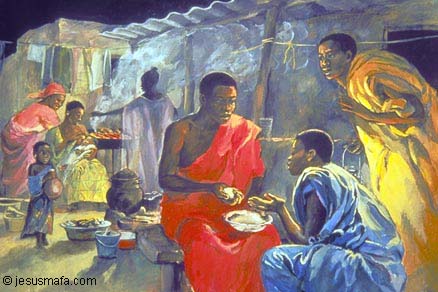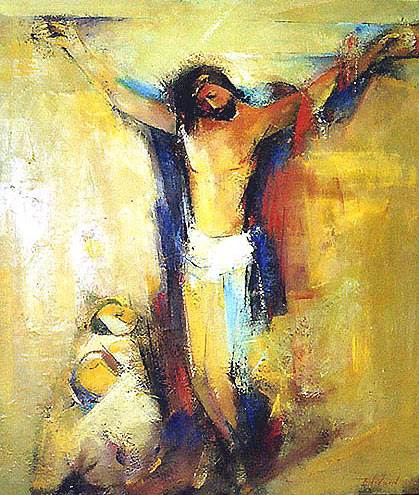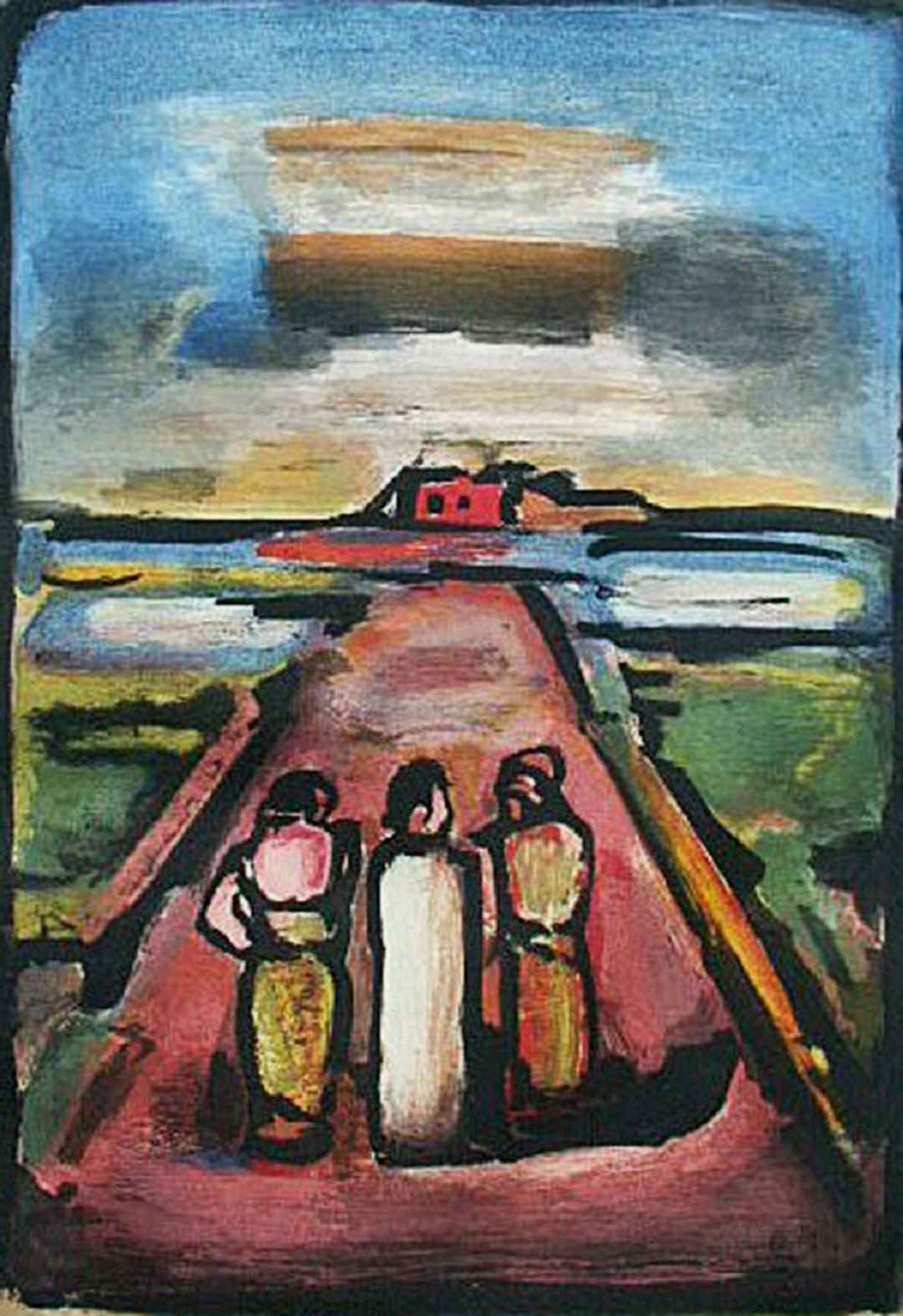Two reflections on Luke 24 - the road to Emmaus. It's a narrative the resonates with our time of lockdown. So much of our life is disrupted; like the disciples we're living with grief and confusion. Yet, the risen Lord meets them on the road and opens up to them the scriptures. One day we will break bread together again; until that day may we love and serve. The first reflection is based on a piece I wrote for the Church Times; the second is an imagined interpreting of scripture.
Reflection One
When I was a small child, I used to listen out for the sound of bread being broken at the Eucharist. As a teenager, I remember being desperate to participate and to belong. Since then, the Eucharist has been at the heart of my life.
Friends of mine have an invisible stop watch - waiting to see how far in a conversation we get before I start talking about the Eucharist!
It is the lens through which I see everything; the pulse and plumb line of life. It is a point of encounter with Christ — feeding and forming us in the midst of joy and grief, the mundane and the complex.
This communion with God is intimate - the physicality of touch, taste and sight.
This communion is cosmic - enfolding us into the story of creation and redemption, restoring our vision of God’s Kingdom.
This communion is endlessly repeated, but never the same as the lives of strangers and friends are drawn together; each one of us forgiven, blessed and sent out to love and serve.
This encounter with Christ leads us to taking risky Spirit-led steps as we respond to the cries of the world.
At the moment those cries are sharply focused around the impact of Covid-19. Everything about our lives has been disrupted by disease. For some of us this means isolation, or loneliness; for others, it’s added pressure to relationships. Essential work continues to be done, from hospitals to supermarkets. We’re relearning a body language of love through social distancing.
Our churches and chapels are closed for public worship and private prayer. We’ve moved online, learning new skills to live-stream worship. We’ve reverted to communication by phone and post; we’ve made our homes spaces for prayer.
In some ways, it feels as if we in an unchosen wilderness; I’m not alone mourning the loss of celebrating the Eucharist with you. But perhaps there is hope for us in this season.
In the midst of my sadness, I recalled something my late supervisor wrote: Dan Hardy described the Eucharist as a gathered interval in the scattered life of the church. In this current crisis, I began to wonder, what if we are called to live in this interval that is longer than a week? What might we learn in this an interval of being scattered in our homes as we look forward to the feast?
Perhaps today’s Gospel reading gives us hope and encouragement. We hear of two disciples walking the road to Emmaus. They’re shaken by Jesus’ death; they’ve heard rumours of resurrection; but nothing makes sense. Perhaps, this Eastertide, we’re walking with them.
Image: He Qi - Weren't our hearts burning within us?
Our world is unsettled and fearful; we have questions that we can’t answer; we are haunted by death. Yet, we also hear stories of life-affirming and demanding care. Just as Jesus opened up the scriptures for the bewildered disciples on the Emmaus road, might we too listen more deeply to God’s word?
As we read Scripture’s in the power of the Spirit, might we rediscover who we are called to be, and learn afresh something of God’s ways with the world. Might we invite Christ into our homes - in prayer and study; might our hearts burn within us as we keep going; knowing that one day we will gather to break bread and known the nearness of our risen Lord with us?
We will break bread again; we will know the intimacy of communion - and as we touch, taste and see. Meanwhile, we’re called to live creatively during this fast? In John’s Gospel, Jesus washes feet at the moment we expect him to break bread. It’s an improvisation on the Eucharist in loving service.
How can we do that? Learning to improvise as the scattered church - we know the rhythms and rhymes of such love. As members of Christ’s body we are to improvise, breath by breath in this extended interval: turning outwards in loving service of others in their need.
In the face of the limitations of this crisis - the trauma of sickness, separation, grief and death; in the uncertainties of work and the tasks facing the church we are on the road to Emmaus.
As we hear scripture afresh and may our hearts burn within us; being renewed in love; embracing the grace of forgiveness. And out of that experience, may we bring hope to others; literally sharing food with them.
Image: Jesus Mafa - Supper at Emmaus
Perhaps in this scattered interval, we learn to live the Eucharist more fully? Having been fed and shaped, we walk to our own Emmaus; Christ meets us in this place too. Opening our hearts to scripture - and stretching the horizons of our social imaginations.
Reflection Two
We are walking to our own Emmaus. How does that feel to us? Not knowing the length of this season of lockdown; living with limitations and uncertainty; perhaps noticing the things that matter most to us; or handling extra demands.
On that road, listen to our hearts; be aware of the journey. Where is Christ with us in the midst of this?
Like the disciples, we will carry our own questions; the things that don’t yet make sense; rumours of resurrection mingled with grief.
Jesus doesn’t tell the disciples what to think. He asks them what they’re talking about. He listens to them; he listens to us.
Then the risen Lord invites them, invites us, to listen to the scriptures; to glimpse the rhythms and rhymes of love; to see him there.
And he goes back to the beginning. To the moment our hearts turned in on themselves, to their own desires; taking the apple we wanted; seeking to fulfil our own longings and separating ourselves from love.
The guilt and the shame crept in; and yet in that very moment, God’s love continued to reach out to us, to enfold us, to draw us back; to kindle in our restless hearts the desire for that first love.
And Jesus says, I am he; I am God with you. I step down into darkness and bring light. I am one who even on Mary’s lap reaches out to take the apple once held by Eve and tasted by Adam. Here I forgive you and give you grace. Here I love.
Image: detail Chris Gollon - Madonna and Child
And as we walk, Jesus asks them to share what they know. On the road, they tell this stranger their hopes for a new world, a kingdom of justice and mercy; their desire for healing and peace. All this, they tell him, they’d hoped for. All this they’d seen in Jesus. They tell him how it all went wrong: there was betrayal and denial; it seemed as if hopes were crushed.
But their unrecognised friend, their risen Lord, he takes them back to the psalms. The reality of betrayal is there he says. The close friend who I trusted - the one who shared bread with me; who dipped it in the cup of wine, yes, that friend did betray me.
And yes, my companions did pretend not to know me; they turned away and fled. Yes I was saddened by this; but I knew how hard it is to stay close when love hurts; when it costs so much; and we wonder if it’s worth it.
But even in this, I loved you; when you are alone and let down, I will remain with you. Even now, when it seems so hopefulness, love is drawing you back to me; my dear companions.
And still they talk as they walk. The outpour the dreadful scenes of this week. The violence and the suffering; the death and the burial. How can this be? It makes no sense to them. Surely this is the end.
It’s there in scripture he says. The one who is God with us goes back to the Exodus - to God’s plan for liberation from slavery; a story of freedom and promise. Remember when Moses lifted up a snake to bring healing? So was I lifted up for you. For God so loved the world that he gave his Son. This is he, walking with you. The one who was lifted up to draw all people to God; to love to the end and beyond.
Even so they say. The death happened. So did the burial. How can we keep walking when we’re haunted by grief; by the shadow of death.
Yes, I was mocked and beaten says, the risen Lord; the one is a companion on the way. Yet, it’s all there in the prophets. Yes, there was darkness and a mother’s grief. That is there too. I entrusted by bother to my beloved disciple; I entrusted him to her. For even in this death and burial, a new community is being formed. There is no place where God’s love is not; even here. Even here a seed falls to the ground and dies; and brings life.
And their hearts began to burn within them. They’d heard the rumours of resurrection. Were the women telling an idle tale; or could it be true? It’s the third day; time has passed but what’s changed. And yet, something shifts within them. A warming of the heart.
For those rumours are true; they’re spreading and taking hold. Joy is mingled with tears. It is all there, said the one walking with them. In the psalms - there is healing; I will be brought up from the grave. I will not be abandoned to death, no: wounds will be bound up; new life will break forth.
Image: Georges Rouault - The Appearance of the Road to Emmaus
And on they walk. On we walk. This road to Emmaus. One step in front of the other. Yes, haunted by grief and uncertainty; but not alone. For one walks with us, telling us of God’s love; telling us that love brings life out of death.
Listen to our heart: our restless, aching and hopeful hearts. May they beat in rhythm with this cosmic pulse of love. Make that sign. A visible heart. A heart that is warmed; a heart that loves.
We will break bread again, together, and know Christ with us on this road; on this road, let us break bread in homes; share it in food banks. On this road, may the pulse of scripture stretch our imaginations in hope and love.
© Julie Gittoes 2020







